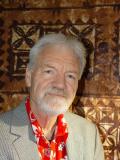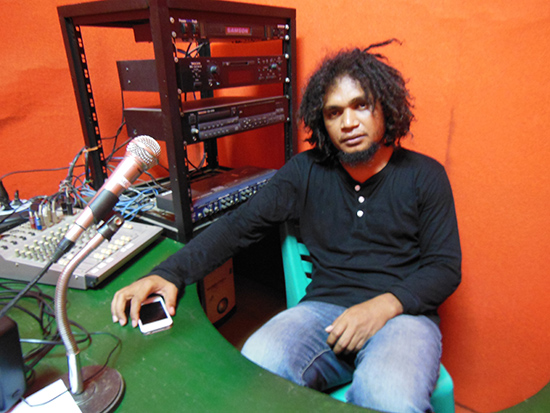
ANALYSIS: When Timor-Leste opens its lawsuit against Australia in a United Nations courtroom spy drama in The Hague this week with the economic survival of this Asia-Pacific country on the line, a small but feisty non-government organisation will be closely monitoring proceedings.
Renegotiation of the great Australian “rip-off” maritime treaty – as some critics have branded it – is at stake in the ultimate end game of the Timorese action against the Canberra government.
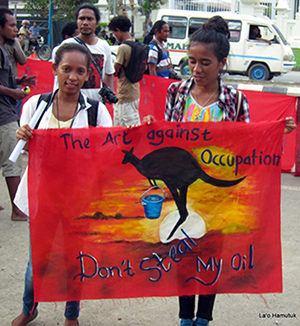 La’o Hamutuk, the Dili-based Timor-Leste Institute for Development Monitoring and Analysis, has been a public watchdog on the oil and gas industry and other vulnerable resources since independence was restored from Indonesia more than a decade ago.
La’o Hamutuk, the Dili-based Timor-Leste Institute for Development Monitoring and Analysis, has been a public watchdog on the oil and gas industry and other vulnerable resources since independence was restored from Indonesia more than a decade ago.
It has waged a public education campaign on the fledgling country’s annual budgets and an eagle-eyed surveillance of how the Timor Sea oil riches are being spent.
La’o Hamutuk has been committed to a strategy of public information and transparency in an attempt to help Timor-Leste sidestep the ravages of the so-called “resource curse”.
This phenomenon is based on the notion that nations that have an abundance of natural resources such as petroleum or mining tend to perform economically worse than countries that are not so blessed.
“We publish the truth, we don’t care what the global banks or the government think,” says advocate Juvinal Dias, one of the campaigners leading La’o Hamutuk’s strategic education programme.
Spy revelations
But the NGO’s low-key campaign took a backseat last month after revelations that Australia had used espionage to gain an unfair economic advantage over Timorese negotiators and to pressure them into a desperate agreement over the oddly named Certain Maritime Arrangements in the Timor Sea (CMATS) treaty in 2006.
In a scathing article titled “The poor cannot afford justice”, British-Canadian foreign affairs commentator Gwynne Dyer described the spying by Canberra to be “too shameful to share even with the other four countries of the ‘Anglosphere’” – its fellow members in the so-called “Five Eyes” hi-tech surveillance cartel, Canada, New Zealand, United Kingdom and United States.
Under the CMATS treaty, Australia wrested a half share in the Greater Sunrise oil and gas field believed to be worth up to US$40 million. However, the field is far closer to the Timor-Leste coastline, which is just 100 km away in contrast to 400 km to the Australian coast.
According to Dyer, Australian espionage was arranged so that it could “rip its neighbour off” in the treaty negotiations.
And a clause prevented “renegotiation” for 50 years – probably long after the oil field would be exhausted. But the espionage revelations opened the door for Timor-Leste to take action.
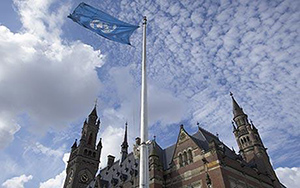 Timor-Leste is one of the world's poorest countries. The nation of 1.2 million people has a largely undeveloped infrastructure and about 92 percent of its economy depends on the oil and gas industry.
Timor-Leste is one of the world's poorest countries. The nation of 1.2 million people has a largely undeveloped infrastructure and about 92 percent of its economy depends on the oil and gas industry.
But it has only about six years to develop an alternative economy and to boost agriculture and tourism before the current Bayu-Undan oil and gas reserves run out in 2020 – about four years earlier than previously thought.
Public education
La’o Hamutuk has been on the case in its many public education meetings, driving home the message of how important it is to diversify and to spend current budgets wisely.
But right now the Timor-Leste government, whose Prime Minister Xanana Gusmao, 67, announced last week in his US$1.5 billion state budget speech that he would retire from the top job before the end of this year, is concentrating on its “David and Goliath” battle with Australia in the International Court of Justice.
Timor-Leste wants the court to make a judgment ordering Canberra to return documents its state espionage agency seized last year in raids related to the country’s arbitration case seeking the tearing up of the CMATS treaty.
“It’s simple – we’re asking for our documents back. Australia has unlawfully taken documents that are rightfully the property of Timor-Leste,” council of ministers chief Agio Pereira told Agence France-Presse in The Hague.
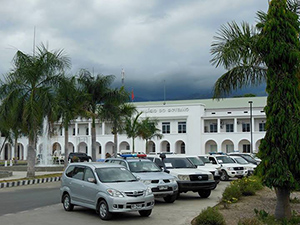 Four Australian Security Intelligence Organisation (ASIO) agents posing as aid workers reportedly bugged the Timor-Leste government offices while doing renovations.
Four Australian Security Intelligence Organisation (ASIO) agents posing as aid workers reportedly bugged the Timor-Leste government offices while doing renovations.
The former Foreign Minister, Alexander Downer, whose administration had given the go ahead for the spying mission, now heads a lobbying company advising Woodside Petroleum, the Australian company that gained from the CMATS treaty.
In November, the Australian government arrested a whistleblower and cancelled his passport to prevent him giving evidence in the case.
Raided offices
It also raided the Canberra offices of the Australian lawyer acting for Timor-Leste, Bernard Collaery, and seized documents.
Protesters in Timor-Leste last month condemned the Australian actions, accusing Canberra of “stealing our oil” and calling for a maritime “median line now”.
Collaery represents the Timor-Leste government in its lawsuit filed last year to seek cancellation of the CMATS treaty in the Permanent Court of Arbitration (PCA) in The Hague.
The case before the ICJ opening this week is a public hearing and will shed some light on the tug-of-war between the two countries.
The Timor-Leste government seeks handing over the documents crucial for its arbitration case and an Australian guarantee that it will stop intercepting communications between its ministers and lawyers.
“But the case may still be settled out of court,” suggests columnist Dyer, “because East Timor is still desperate.
“Woodside has not yet started developing the Greater Sunrise field, and it will never do so if there isn’t a deal.
Price of justice
“Offer East Timor another 10 percent and a promise to go ahead, and it will probably drop the case. The poor cannot afford justice.”
Whatever happens, La’o Hamutuk will continue its scrutiny of the country’s economic affairs. It believes the government is spending too much on consumer goods for the impoverished country and not enough on agriculture, education and health.
It also reckons that the government has been seduced by a grand plan for the south coast of Timor-Leste involving massive investment in an airport, highway and oil refinery based on unrealistic expectations about the oil industry future.
In a recent book, Beloved Land: Stories, struggles and secrets from Timor-Leste, author Gordon Peake praised La'o Hamutuk and advocates Juvinal Dias and Charlie Scheiner for their work in exposing government decisions to "ignore, neglect and downplay" the development of non-oil sectors of the economy.
"The new nation is currently the most-resource-revenue-dependent country in the world, but the reserves will provide an income of less than $2 per person per day for the next few decades - hardly enough for any ordinary person to be considered a 'lucky winner'."
While some government officials appreciate what La’o Hamutuk says in terms of economic analysis, others don’t, especially Petroleum Minister Alfred Pires who wants the south coast project to go ahead.
“Some appreciate what we do, but some are not really happy,” says Dias. “This is normal – a political characteristic of advocacy.”
He sees strengths for La’o Hamutuk’s work that include:
• Providing independent economic analysis based on facts
• Belief in principles and justice
• Educating Timor-Leste people on development issues and explaining options – “the people have a right to decide what is best for them”.
• Refusing to be compromised by funding from foreign donors or other agencies that may be involved in influencing the government.
Greater transparency
La’o Hamutuk also strives for greater democracy and transparency about process. On November 8, it wrote a letter to Parliament expressing its concern about the process and commenting on the content, including saying that “we have only six years to develop our non-oil economy and markedly increase domestic revenues”.
It has criticised a decision this month for an ad hoc committee reviewing the 2014 budget – after the opposition Fretilin Party called for the budget to be reduced to $1.3 billion and others proposing 426 amendments – seeking to meet behind closed doors.
The La’o Hamutuk blog described this as a “serious setback for democracy”, as citizens deserved to hear the discussion and voting on many “significant issues”.
“The public also needs to know what trade-offs, horse-trading and compromises are being made – as well as what the MPs have decided not to talk about.”
ASIO claims by East Timor 'offensive', says Australia
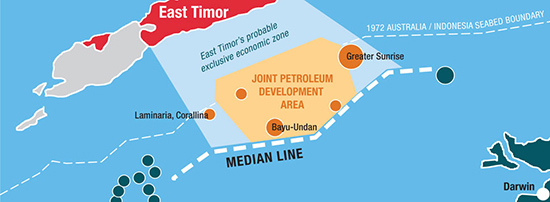
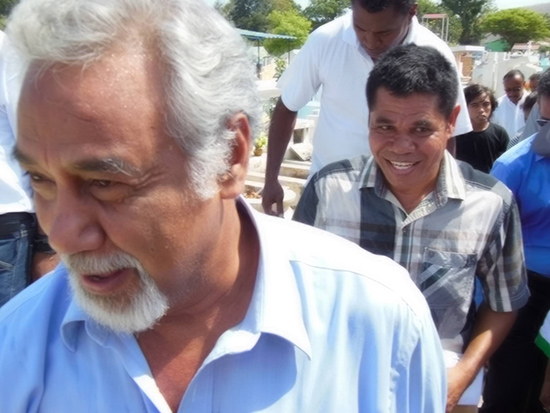
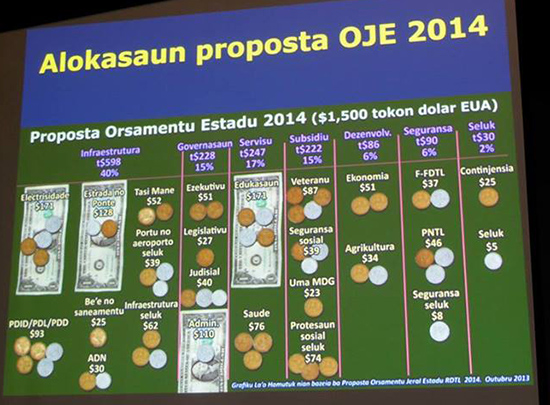
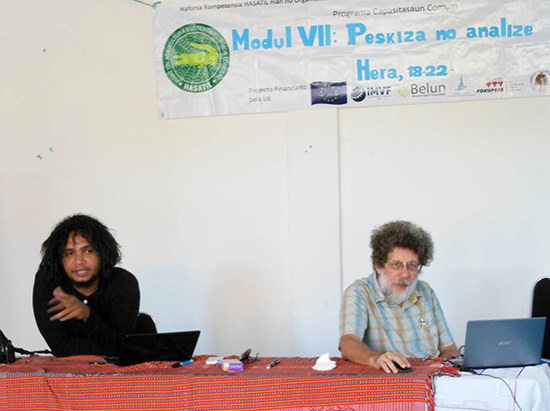
This work is licensed under a Creative Commons Attribution-NonCommercial 3.0 New Zealand Licence.




